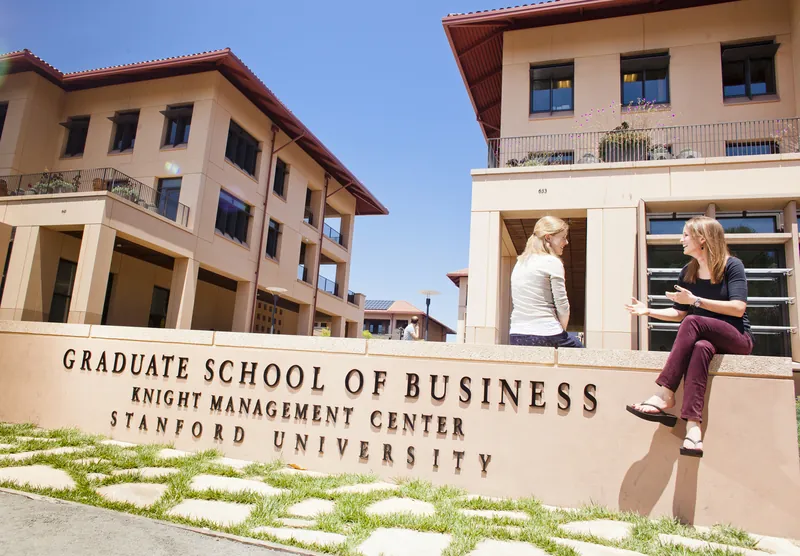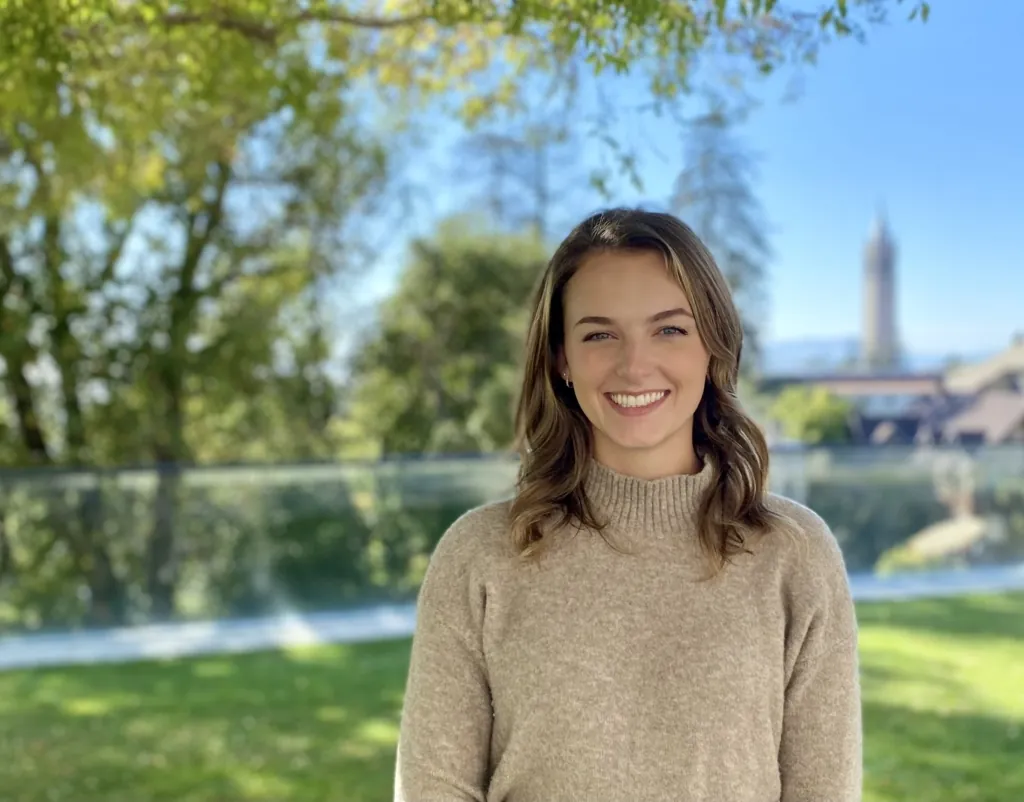
Stanford Graduate School of Business has produced more of the highest-funded MBA startups than any other school, tying Harvard Business School with 31 startups on Poets&Quants’ 2025 list.
THE ENDURING STARTUP POWER OF SILICON VALLEY
An MBA founder from Stanford GSB, Josh Payne, has two startups on 2025’s list: Autograph, a digital collectibles platform he co-founded with Tom Brady; and Coframe, an AI website optimization platform that continuously experiments with and refines webpages to boost engagement and conversion rates. Together they have raised more than $214.3 million.
Payne, who holds an MS in computer science from Stanford, developed GPT-Migrate, one of the earliest widely used coding agents, and has authored more than 20 peer-reviewed papers and patents, most of them focused on AI. He’s also a guest lecturer at Stanford.
“Most of the top AI talent is concentrated in the Bay Area. There are exceptions – Mistral in Paris, Lovable in Sweden – but the highest density of talent is still in San Francisco,” Payne told the World Economic Forum this April for its Forum Stories Newsletter.
He’s right. By location, the San Francisco Bay Area continues to be a formidable startup hub thanks to its AI ecosystem. But it wasn’t the top location for MBA startups in 2025. That distinction went to New York City.
This year, the number of MBA startups on the list located in San Francisco fell from 29 to 22 while the number in NYC rose from 24 to 26. The Boston area – close to both Harvard Business School and MIT – had the next highest number of MBA startups at nine.
There were 24 startups based outside of the U.S. including seven in Mexico and three each in Europe and Brazil.
No schools churn out more highly-funded MBA startups than Stanford GSB or Harvard Business School. This year, they account for 62 out of the top 100, each placing 31 startups. HBS startups raised $806 million from angel investors and venture capitalists over the last five years compared to Stanford’s $1.19 billion.
Two schools have seven startups apiece for 2025: UC Berkeley Haas School of Business raising a total of $547.80 million and Columbia Business School raising $125.04 million.
Among Harvard’s 31 startups on this year’s list, two ventures illustrate the school’s entrepreneurial range.
Vulcan Elements, founded in 2023 by former Navy officer and HBS student John Maslin, is tackling rare-earth magnets, a major choke point in global trade. The North Carolina-based company recently raised $65 million in Series A funding to ramp up U.S. production of magnets essential to drones, electric vehicles, and defense technologies. The round, announced August 11, 2025, was led by Brad Gerstner’s Altimeter Capital, with participation from One Investment Management.
Maslin launched Vulcan after realizing how dependent the U.S. is on China, which controls about 90% of the world’s magnet supply.
“When you talked about rare-earth magnets a couple years ago, they would look at you like you’re insane,” Maslin told The Wall Street Journal. “People actually understand the strategic importance of onshoring this now.”
At the other end of the spectrum is Claim, a consumer rewards app founded by HBS classmates Samuel S. Obletz and Tap Stephenson. Instead of spending money on targeted online ads through companies like Google or Instagram, businesses give customers direct rewards through Claim’s app – typically $5 to $15 off a product – while Claim profits from a service fee.
Claim launched while the co-founders were still at HBS, using Harvard and other Boston-area universities as early testing grounds. Still early in its trajectory, Claim has gained traction as a privacy-conscious alternative to digital advertising.

Hannah Weber, MBA/MPH UC Berkeley Haas, co-founded HOPO Therapeutics, which secured a BARDA contract worth up to $226 million to develop the first oral therapy for heavy-metal poisoning.
21 STARTUPS CO-FOUNDED BY WOMEN
Twenty-one startups on this year’s list were founded or co-founded by women, collectively raising $523 million over the past five years. While that’s a slight dip from 23 women-founded startups in 2024 and 25 in 2023, women-led ventures continue to land among the year’s biggest fundraisers. In fact, the fifth highest-funded startup on the 2025 list was co-founded by a woman.
HOPO Therapeutics is a clinical-stage biotech co-founded by Haas MBA/MPH student Hannah Weber alongside chemists Rebecca Abergel and Julian Rees. They are developing the first oral treatments for heavy-metal poisoning and radiological exposure. In October 2024, HOPO was awarded a contract worth up to $226 million from the Biomedical Advanced Research and Development Authority (BARDA).
“We launched HOPO Therapeutics as a spin-out venture after realizing the incredible global impact this technology could have on patients suffering from heavy metal poisoning,” Weber told Poets&Quants in 2022 when the venture was selected as one of our Most Disruptive Startups of the year.
“Lead poisoning affects over 1 billion people, comparable to Malaria or HIV, but there has been no innovation in treatment in decades. With 99% of all patients left without any available treatment, most living in low- and middle-income countries, we feel driven to provide a safe and affordable solution.”
After HOPO, the four highest funded MBA startups with women co-founders include:
- Kocomo (No. 14) is a real estate startup founded by Harvard Business School MBAs Graciela Arango and Euan Cassie in 2021. It has raised $57 million to date.
- Vaulted Deep (No. 26) uses technology adapted from the oil and gas industry to permanently inject organic waste deep underground, simultaneously removing carbon from the atmosphere and preventing local air, water, and soil contamination. It was founded by Stanford GSB MBA Julia Reichelstein and has raised $40.30 million to date.
- Raspberry AI, founded by Stanford MBA Cheryl Liu, provides generative AI software for fashion design and merchandising and has raised $28.50 million since its founding in 2022.
- Highlight, an AI-powered product intelligence platform, has raised $26.30 million since its 2020 founding by CEO Dana Kim, an MBA from University of Pennsylvania’s The Wharton School.
Weber credits the rise of her company, in part, to Berkeley’s entrepreneurial resources such as the Berkeley Skydeck, the Life Sciences Entrepreneurship Center, and fellow founders within her Haas MBA class.
“Growing our venture within the Berkeley ecosystem has been game-changing for us as entrepreneurs,” she told P&Q.
“Pursuing a dual MBA/MPH degree has allowed me to have one foot in the entrepreneurial support network at Haas, and the other in the School of Public Health, where experts in environmental health, drug development, and access to medicine have helped us shape our approach for the benefit of patients across the world.”
NEXT PAGE: P&Q’s 100 Highest Funded MBA Startups Of 2025
